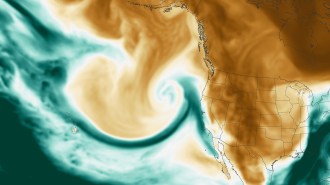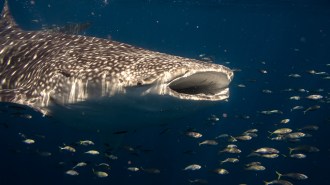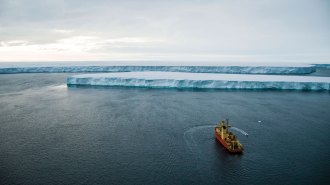Earth
Sign up for our newsletter
We summarize the week's scientific breakthroughs every Thursday.
-
 Animals
AnimalsSome sea turtles are laying eggs earlier in response to climate change
A 1-degree-Celsius change in water temperature prompts sea turtles in Northern Cyprus to lay eggs nearly a week earlier on average.
-
 Climate
ClimateWarming is chasing cloud forests steadily uphill
Cloud forests are biodiversity hot spots and crucial water sources. But climate change and deforestation are shrinking their range, new data show.
By Douglas Fox -
 Animals
AnimalsHow a puffin patrol in Iceland is saving the iconic seabirds
Light pollution disorients young puffins. The Puffling Patrol helps them find their way to the sea.
-
 Climate
ClimateEven desert cities could pull drinking water from the air
Water harvesting from foggy air provided up to 5 liters of water a day in a yearlong Chilean desert experiment.
-
 Earth
EarthEven epic rainfall may not be enough to refill SoCal’s aquifers
More than a dozen atmospheric rivers dumped rainfall on California in 2023 but replenished only 25 percent of the water lost from aquifers since 2006.
By Sid Perkins -
 Plants
PlantsA bacteria-based Band-Aid helps plants heal their wounds
Recent research into bacterial cellulose patches may speed plants' recovery, improve grafting and help with preservation.
-
 Animals
AnimalsMigrating whale sharks make pit stops at oil and gas rigs
Human-made structures act as artificial reefs, luring plankton and, in turn, Earth’s largest fish. That could put whale sharks at risk of ship strikes.
-
 Climate
ClimateHistorical writings reveal how people weathered the Little Ice Age
Records from 500 years ago document floods, famine and death in 16th century Transylvania due to wild weather swings during the Little Ice Age.
By Alex Viveros -
 Climate
ClimateJust a small rise in global temperatures could be deadly
As early as mid-century, an area of land that adds up to the size of the U.S. could hit temperatures hazardous for human health.
By Meghan Rosen -
 Earth
EarthSpooky floating lights in South Carolina could be earthquake farts
Gases that rise from the earth during earthquakes could explain strange sightings of floating balls of light.
By Nikk Ogasa -
 Climate
ClimateCan geoengineering plans save glaciers and slow sea level rise?
As climate change melts West Antarctica’s glaciers, scientists are proposing bold ideas to avoid devastating sea level rise. Will they work?
By Douglas Fox -
 Health & Medicine
Health & MedicineToxic dangers lurk in LA, even in homes that didn’t burn
Urban wildfires like LA’s make harmful chemicals from burning plastics and electronics that can make indoor air dangerous for months.